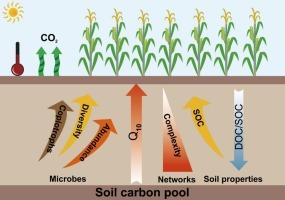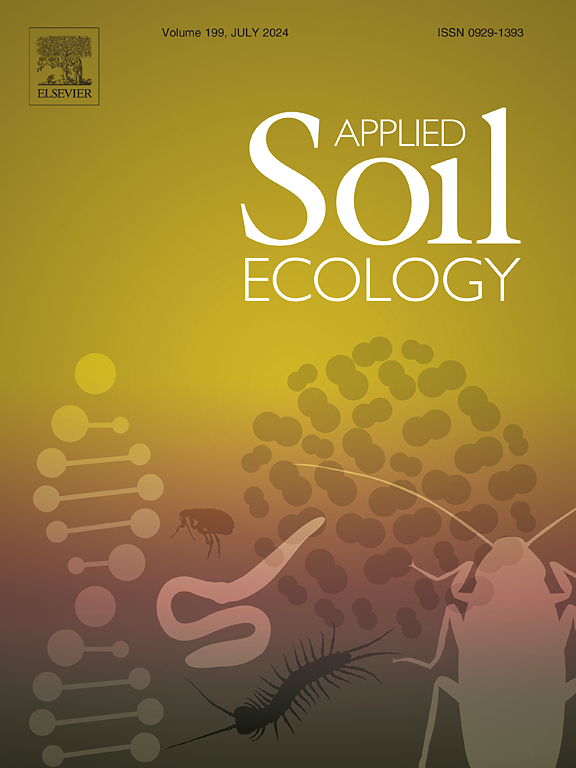有机碳分解温度敏感性与耕地土壤中共养微生物类群的相对丰度呈正相关关系
IF 4.8
2区 农林科学
Q1 SOIL SCIENCE
引用次数: 0
摘要
揭示土壤有机物质分解(Q10)的温度敏感性与微生物群落之间的关系,对于预测生态系统对全球变暖的反馈至关重要。然而,人们对二者之间的关系还知之甚少,尤其是在低纬度地区。为了填补这一知识空白,研究人员从气候和环境条件差异极大的中国西南地区的 100 个耕地采集了土壤样本。结果表明,不同地区的 Q10 值差异很大,从 1.85 到 6.81 不等,平均值为 3.27。它们与土壤有机碳含量呈明显的正相关,而与土壤溶解有机碳与总有机碳含量之比呈负相关。这表明,有机碳含量高的土壤更容易受到全球变暖的影响。进一步分析表明,Q10 值与土壤微生物呼吸速率、真菌丰度、原核生物多样性和共养微生物种系的相对丰度呈正相关,但与寡养微生物比例和微生物共生网络度呈负相关。结构方程模型分析表明,土壤有机碳及其质量以及微生物属性是解释 Q10 值变化的主要因素。这项研究的结果凸显了土壤微生物群在决定生态系统对全球变暖的反馈中的关键和复杂作用。本文章由计算机程序翻译,如有差异,请以英文原文为准。

Organic carbon decomposition temperature sensitivity positively correlates with the relative abundance of copiotrophic microbial taxa in cropland soils
Revealing the relationships between the temperature sensitivity of soil organic matter decomposition (Q10) and microbial communities is critical to predict ecosystem feedbacks to global warming. However, the relationships are still far from well understood, especially within the low latitude regions. To address this knowledge gap, soil samples were collected from >100 cropland sites in Southwest China, a region with highly diverse climatic and environmental conditions. The results showed that Q10 values substantially varied across the region, ranging from 1.85 to 6.81, with an average value of 3.27. They were significantly positively correlated with the contents of soil organic carbon, while negatively correlated with the ratios of soil dissolved organic carbon to total organic carbon content. This indicates that soils with high organic carbon contents are more vulnerable to global warming. Further analysis suggested that Q10 values were positively correlated with soil microbial respiration rates, fungal abundance, prokaryotic diversity, and the relative abundance of copiotrophic microbial lineages, but negatively correlated with the proportions of oligotrophic microbes and microbial co-occurrence network degree. The structural equation modeling analysis suggested that soil organic carbon and its quality, as well as microbial attributes were the main factors explaining the variation in Q10 values. The findings in this study highlight the crucial and complex roles of soil microbiome in determining ecosystem feedbacks to global warming.
求助全文
通过发布文献求助,成功后即可免费获取论文全文。
去求助
来源期刊

Applied Soil Ecology
农林科学-土壤科学
CiteScore
9.70
自引率
4.20%
发文量
363
审稿时长
5.3 months
期刊介绍:
Applied Soil Ecology addresses the role of soil organisms and their interactions in relation to: sustainability and productivity, nutrient cycling and other soil processes, the maintenance of soil functions, the impact of human activities on soil ecosystems and bio(techno)logical control of soil-inhabiting pests, diseases and weeds.
 求助内容:
求助内容: 应助结果提醒方式:
应助结果提醒方式:


